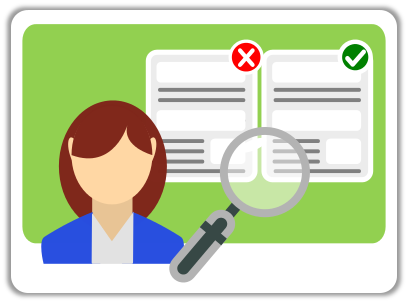What is the topic about?
This page provides an overview of the process involved in the selection process for an application for a Grant, Accreditation and Accredited Grant for the Erasmus+ and European Solidarity Corps programmes.
Using the example of a Grant application for the Erasmus+ programme, as the application goes through each phase of the selection cycle, the tasks that the NA performs are outlined below. The basic steps performed are, with some small exceptions, the same for accreditation, accredited grant and grant requests.
What happens once the application is submitted?
 Receive and register applications
Receive and register applications
All applications received by the National Agencies are registered in their project management tool. The National Agency will acknowledge the submissions of the application.
Perform eligibility check
The eligibility criteria are used to determine whether the applicant is allowed to participate in a call for proposals and to submit a proposal for an action. They apply to the applicants and to the projects/activities for which the grant is requested (e.g. profile and/or the number of participating organisations involved, type of project or/and activities, implementation period, profile and/or the number of participants involved).
To be eligible, the applicant and the project must meet all the eligibility criteria relating to the Action under which the proposal is submitted. If the project does not meet the eligibility criteria at application stage, it will be rejected without being further evaluated. If it appears at implementation or final report stage that these criteria have not been fulfilled, the activities may be considered ineligible with a consequent recovery of the EU grant initially awarded to the project.
Project proposals are checked by the National Agency on the basis of the criteria described in the Erasmus+ Programme Guide for the specific key actions.
 Verify multiple submission
Verify multiple submission
For actions managed by the Executive Agency, applicants may submit more than one proposal for different projects under the same call (and be awarded a funding for them). Organisations may participate in several proposals. However, if there are several proposals for very similar projects, only one proposal will be accepted and evaluated; the applicants will be asked to withdraw one of them (or it will be rejected).
Proposals may be changed and re-submitted until the deadline for submission.
For actions managed by the National Agencies, in case of multiple submissions of the same application by the same applicant to different Agencies, all applications will be rejected. Should almost identical or similar applications be submitted by the same or different applicant to the same or different Agencies, they will all be subject to a specific assessment and may all be rejected.
The NA will verify multiple submissions.
 Perform quality assessment
Perform quality assessment
...a quality assessment to evaluate the extent to which the application meets the award criteria. Such quality assessment is in most cases carried out with the support of independent experts. In their assessment, experts will be supported by guidelines developed by the European Commission; For actions managed by the Erasmus+ National Agencies, these guidelines will be made available on the websites of the European Commission and of the Agencies responsible for the management of Erasmus+ projects in each country;...
 Verify double funding
Verify double funding
... a verification, that the proposal does not present risks of double funding. If necessary, such verification is carried out in cooperation with other Agencies or other stakeholders.
 Certify Organisation
Certify Organisation
Certification of an organisation is performed by the National Agencies in their project management tool. Organisation certification is required for the beneficiary and/or coordinator and is done for all key actions. Organisation certification includes actions such as:
- Checks to confirm the data registered in the Organisation Registration system corresponds with the organisation's legal data.
- Checks to confirm that the organisation applied the correct Organisation ID.
- Checks to confirm if any multiple Organisation IDs exist for the organisation and more.
 Elaborate selection (Selection committee)
Elaborate selection (Selection committee)
The National or Executive Agency will appoint an evaluation committee to manage the whole selection process. On the basis of the assessment carried out by the evaluation committee – if needed with the support of experts - will select and establish a list of projects proposed for the grant award.
 Final decision
Final decision
At the end of the evaluation procedure, the National or Executive Agency decides on the projects to be awarding the grant on the basis of:
- the ranking list proposed by the evaluation committee
- the budget available for any given Action (or any given activity within an Action)
After the completion of the evaluation procedure, the application files and accompanying material are not sent back to the applicant, irrespective of the outcome of the procedure.
 Notify outcome of Selection
Notify outcome of Selection
All applicants will be informed about the evaluation result through an evaluation result letter. This letter will contain further instructions about the next steps in the process towards the signature of the grant agreement.
The National Agency will inform the applicants on the outcome of the selection process.
